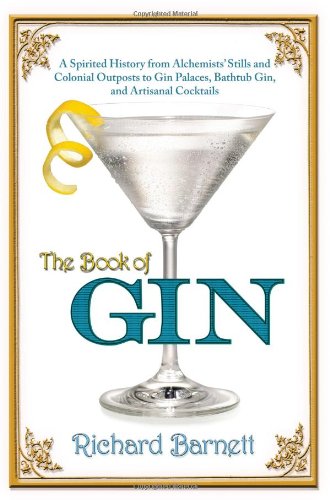
The Book of Gin
A Spirited History from Alchemists' Stills and Colonial Outposts to Gin Palaces, Bathtub Gin, and Artisanal Cocktails
- اطلاعات
- نقد و بررسی
- دیدگاه کاربران
نقد و بررسی

July 16, 2012
In the book’s prologue, Barnett captures the essence of his work in one line: “Gin’s proverbial clarity, like a prism of clear glass, refracts a rainbow of historical color.” Not only does this sentence portend the chronological account of “this liquid fire” to come but also gives a glimpse of Barnett’s incisive thought process and distinguished prose. The author of Medical London: City of Diseases, City of Cures, Barnett begins with distilled alcohol’s and juniper oil’s early incarnations as intoxicants and elixirs, and his expertise and passion for the subject is immediately gin-clear. At times, Barnett’s research is so thorough that when he outlines London’s 18th century “gin craze” that led to a host of parliamentary Gin Acts, the reader gets a little drunk of information. But as Barnett explores gin’s role in the creation of the cocktail, and the tale shifts to America, where gin’s bootlegging and pop culture connections are exposed, his story becomes an intoxicating blend of history and entertainment that is sure to stimulate drinkers and teetotalers alike.

November 15, 2012
Gin and tonic? Gin rickey? Gin gimlet? Stop being so prissy: In this lively history, Barnett (Medical London, 2008, etc.) notes that the way to drink gin is neat, "with perhaps an occasional dash of bitters to soften the rough edge of pot-still spirit." You don't have to be British to like gin--indeed, writes the author, most of the output of the Tanqueray plant, now located in Scotland, is sent to the United States. However, though invented in its more-or-less modern form in Holland (or perhaps Belgium), gin is a very British thing to drink. Readers of Robert Hughes' book The Fatal Shore (1986) may remember its opening gin-soaked pages, public drunkenness being one cause for so many Cockneys to be sent packing to the Antipodes. Londoner Barnett pays homage to Hogarthian visions of the streets of the British capital, but he's as much interested in the chemistry of the sauce as he is in its (mostly deleterious) social effects. Accordingly, he offers a kind of prehistory of gin that takes us through cultures that have found interesting things to do with juniper, including the Finns and their sahti, "a beer flavored with juniper berries instead of hops, and filtered through juniper twigs," and the ancient Romans, whose physicians counseled applying crushed juniper berries to the genitals in order to chase away unwanted offspring. Barnett charts the rising and falling fortunes of gin, from poor man's swill to retro-lounge hipster's beverage of choice, and he closes with a personal and highly provisional catalog of favorite gins, from stalwarts such as Beefeater to more bespoke lines such as Wees Distillery Very Old Geneva and the British-Icelandic hybrid Martin Miller's Westbourne Strength Gin. A toper's pleasure, though perhaps it should come with a warning label.
COPYRIGHT(2012) Kirkus Reviews, ALL RIGHTS RESERVED.

November 15, 2012
Gin Lane, Hogarth's famous print showing eighteenth-century Londoners in a riot of drunkenness, makes an entertaining frontispiecebut The Book of Gin paints a much broader picture. Barnett, whose writing credits include both the medical journal the Lancet and the entertainment weekly Time Out, offers an absorbing popular history of one of history's most popular drinks. Beginning with the ancient origins of distillation, he vividly depicts Old England's ups and downs with regulation and consumption, and the births of the gin-and-tonic, Prohibition, and the cocktail era, and soon arrives in modern times. We are, he says, in the middle of a gin renaissance: Now is the best time in the last five centuries to be drinking gin. Generous appendixes include period writings and recipes, and Barnett's scrupulous research is evident in endnotes, a lengthy bibliography, and a detailed index. While not, perhaps, written with the widest possible readership in mind, this is nonetheless a well-balanced blend of popular history and scholarship, written in a style as dry and bracing as its subject.(Reprinted with permission of Booklist, copyright 2012, American Library Association.)




دیدگاه کاربران